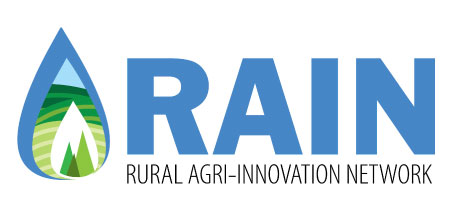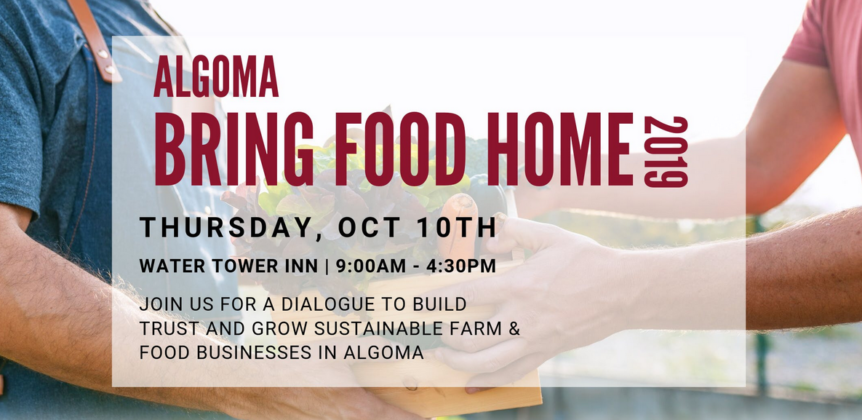The first of four Bring Food Home 2019 Regional Conferences took place on October 10th in both Ottawa and Algoma via video conference, with Just Food and Algoma regional partners including Rural Agri-Innovation Network (RAIN), Algoma Public Health, Johnson Farmers’ Market and Harvest Algoma United Way of Sault Ste. Marie & Algoma District, co-hosting a province-wide panel and discussion on the systems-wide consequences of Canada’s new Food Guide.
The lively discussion explored how to support local and regional food systems, how the new Food Guide can shape our food systems and impact where we get our food, and what this means for agriculture, producers, community organizations, government and eaters. NORDIK Institute helped to facilitate the discussion circles and collect contributions to develop a Policy Paper, “Bring Food Home Algoma: Policy Paper on Building Resilient Futures”.
Download the Policy Paper here: https://rainalgoma.ca/wp-content/uploads/2020/03/BFH-Policy-Paper.pdf
Powerpoints and videos from the
morning panel, as well as the afternoon event that continued in Algoma, are now
available online and we encourage you to check them out: https://rainalgoma.ca/resources/
https://bringfoodhome.com/
Overall, the needs and challenges voiced at the Forum presented valuable information to support the local and regional food system. Themes include:
- Education: There is a need for education and sharing of knowledge about food production, processing, preparation, and food security across many sectors.
- Cultural Appropriateness: Different cultural groups have different needs and expectations related to food production and consumption, and people from different cultural groups should cooperate to support the local diverse communities,
- Collaboration and Coordination: Strengthening the food system will require groups from across many sectors and across the region to work together and share knowledge.
- Health and Equity: A robust and sustainable local food system that meets the needs of diverse communities throughout the region and that encourages all people to be involved in food production and preparation will improve health and contribute to ensuring everyone’s needs are met. For this reason, the food system is a social determinant of health.
- Diversification and Sustainability: Diversifying local food production and encouraging sustainable practices are integral to the future health of the local food system.
A number of policy recommendations emerge from the findings, which have been supported by the partners. These offer ways for policy makers to contribute to supporting the development of a robust, sustainable, and diverse local food system:
Policy makers at the federal & provincial level:
- Support the development of sustainable food security programming, including:
- Healthy eating programs;
- Food literacy education from primary school through to college and university;
- Programs documenting and promoting ecological and indigenous food knowledge;
- Maintain existing agricultural and related trade degree and diploma programs and expand to meet emerging needs.
- Support Indigenous leadership to tackle food insecurity in Indigenous communities.
- Support further development of agricultural infrastructure in Northern Ontario.
Policy makers in First Nations & local governments:
- Develop ‘Food Charters,’ concrete local food plans for how communities wish to have their food systems maintained.
- Develop partnership models across sectors.
- Change bylaws to support community members’ ability to grow and raise their own food, while also supporting the development of agricultural infrastructure in Northern Ontario.
Policy makers in health, education & training sectors:
- Support the development of sustainable food security programming, including:
- Healthy eating programs;
- Food literacy education from primary school through to college and university;
- Programs documenting and promoting ecological and indigenous food knowledge;
- Maintain existing agricultural and related trade degree and diploma programs, and expand to meet emerging needs.
- Increase access to local foods within health, education and training institutions.
- Facilitate producers and distributors working with government, civil society, and funders to develop agricultural infrastructure, training, and job creation programs based on changing demographics and local needs.
Follow up
The partners from the Bring Food Home event would like your feedback on these recommendations and your participation in communicating the recommendations to organizations, communities, enterprises and individuals. We will also reach out to you with any next steps or future events. Please add your contact information to this electronic form (https://zfrmz.com/27hxC2q4qIm70tRNiXsj) so that we can reach you with our follow-up survey. For more info, contact David Thompson RAIN Manager

